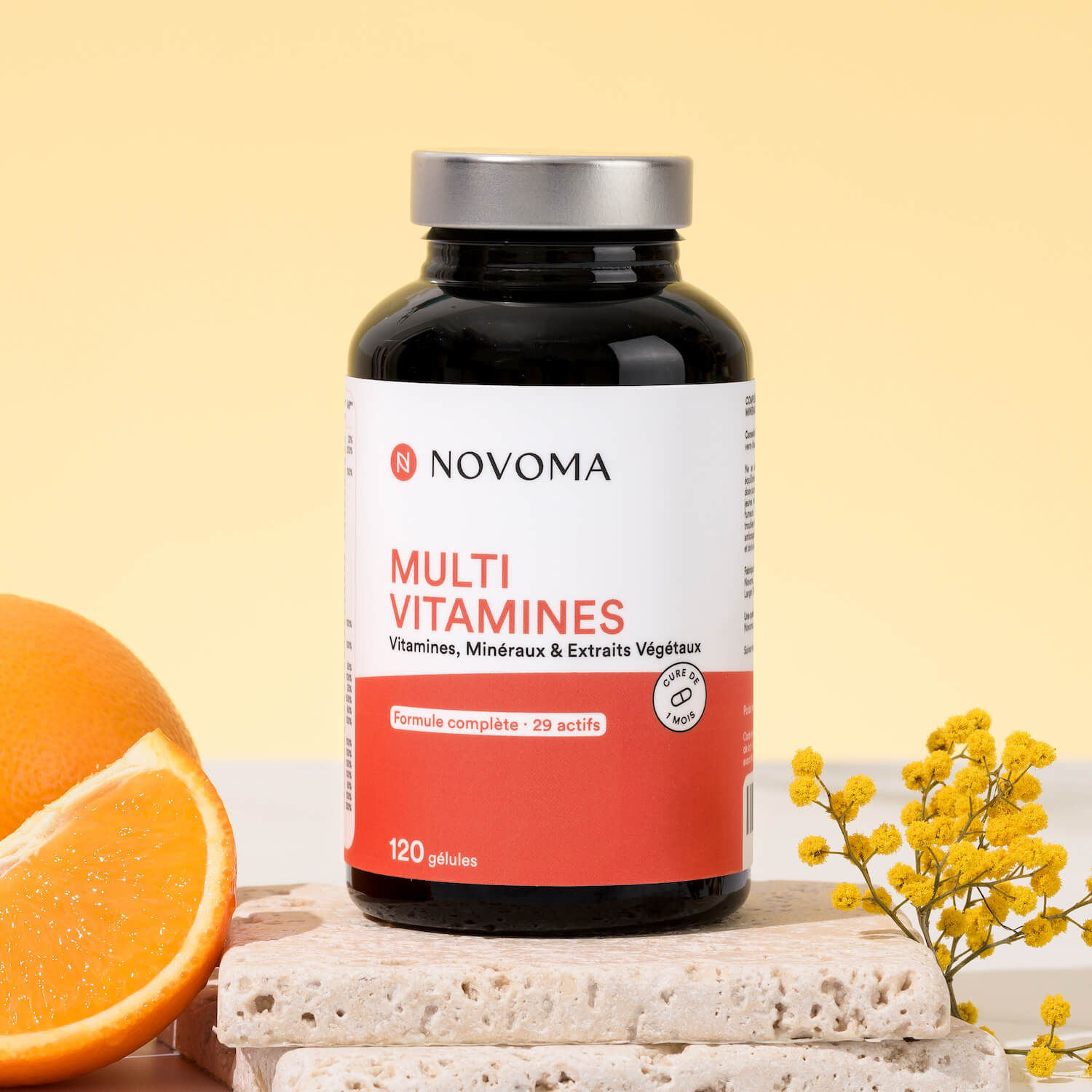
Vitamin A
The majority of foods contain different vitamins essential to the body. Among them, there is vitamin C, vitamin D, vitamin B and even vitamin A. It is the latter, which provides many health benefits, which will interest us here.
Where to find vitamin A? What is his role ? How to supplement? Find out everything you need to know about this super vitamin!

What is vitamin A?
Vitamin A is part of the category of fat-soluble vitamins , meaning it is soluble in fats (like vitamin D).
Essential for the body, it plays many roles. It contributes to the proper functioning of the immune system , ensures good quality of vision and helps maintain the skin in good health.
Vitamin A exists in different forms: retinol , retinyl palmitate , retinal or retinoic acid . These different forms have a similar chemical structure but are distinguished by their location in the body. Retinoic acid is, for example, present in bones or in mucous membranes while retinyl palmitate is stored in the liver.
Sources of vitamin A are quite varied. It can first of all be found in foods of animal origin . This is particularly the case for retinol.
Foods of plant origin (fruits and vegetables such as oranges or carrots) can also provide vitamin A, in the form of carotenes such as beta carotene . Carotenes, called provitamin A , are precursors of vitamin A, which means that the vitamin requires conversion in order to be used by the body.
What are the symptoms of vitamin A deficiency?
Vitamin A deficiency can cause different symptoms:
- dryness of the skin;
- pale, dry skin;
- headaches ;
- muscle pain;
- abdominal and joint pain;
- respiratory infections;
- night blindness;
- drying out of the cornea.
To avoid deficiency, it is recommended to consume between 800 μg of vitamin A per day.
We recommend you
Multivitamins
Complete multivitamin formula based on 29 vitamins, minerals and plant extracts.
- ✅ 800 μg of vitamin A (beta-carotene)
- ✅ Assimilated or natural shapes
- ✅ 1 month of treatment
- ✅ Made in France
What are the benefits of vitamin A?
Vitamin A provides many benefits, both for the skin and for vision.
Vitamin A, a substance with powerful antioxidant properties
As a provitamin, beta-carotene therefore turns out to be a carotenoid. Therefore, it is considered a natural antioxidant for the body. Thanks to this antioxidant property, it helps prevent free radicals and reduce the damage they cause to the body.
By eliminating free radicals, this provitamin can delay tissue aging and prevent certain diseases such as cancer or heart problems. A good dose of vitamin A even preserves intellectual and cognitive abilities in the elderly.
It helps to have glowing skin
In humans, melanin is responsible for hair coloring or skin pigmentation . However, vitamin A promotes the activation of melanin as well as hydration of the skin. As a result, this organic substance participates in cell renewal.
It helps the skin to regenerate better and resist the sun's rays. As a precursor of melanin, it also provides better complexion and a beautiful glow to the skin . In addition, it does not only work on the skin. It also ensures the health of the mucous membranes of the hair and promotes bone growth.
It contributes to eye health
One of the beneficial effects of vitamin A is its contribution to eye health . In fact, it intervenes on the nerve impulses of the optic nerves, subsequently improving vision. A good dose of vitamin A also proves to be effective in treating eye disorders and maintaining good vision .
Vitamin A dosage
Vitamin A dosages are expressed in micrograms (µg) for the retinol equivalent (RE) or in international units (IU). In general, the recommended dose often depends on age and gender.
To do this, for a man, the appropriate dosage is 800 mcg/d (or 800 ER/d or 2,600 IU/d).
For a woman, the appropriate dosage is 600 mcg/day (or 600 ER/day or 2,000 IU/day). In a pregnant woman, this dose is higher.
For an adult, overdose can occur if consuming 3,000 mcg (or 3,000 ER or 10,000 IU) daily.
How to choose the right vitamin A?
In the event of insufficient dietary intake or vitamin A deficiency, supplementation may be necessary.
Here are the two selection criteria to look out for:
- The form of vitamin A (retinol or β-carotene): we advise you to opt for β-carotene, the form of vitamin A of plant origin (often extracted from the algae Dunaliella salina) which is 100% natural and which is suitable for vegetarians and vegans.
- Vitamin A dosage . As we have seen, the right dose is 800 mcg per day.
Vitamin A: precautions for use and contraindications
In general, taking vitamin A remains harmless for the body and is suitable for young and old alike.
However, you must be careful of overdose which can cause osteoporosis, itching, liver problems, and even promote hip fracture (this symptom occurs especially in women after menopause or in the elderly). . During pregnancy, an excess of this vitamin can also lead to fetal malformation.
Also avoid taking a long-term course of vitamin A. If this vitamin promotes the proper functioning of certain organs, long-term intake risks causing certain adverse effects. This may cause fatigue, nausea, stomach problems, or irritability.
Regarding contraindications, vitamin A is not recommended:
- To smokers. Beta-carotene may increase the risk of lung cancer;
- To people following treatments based on retinoic acid in order to avoid certain adverse effects;
- For people with liver disease to avoid worsening of liver disease.














